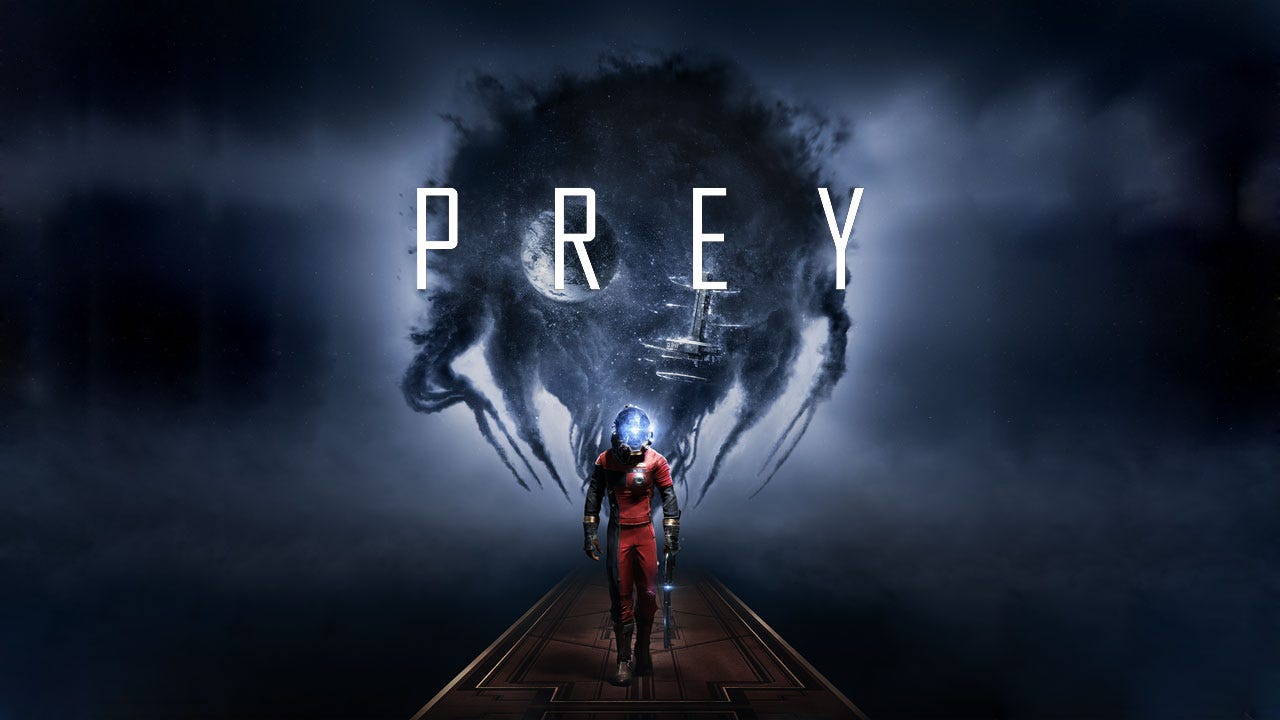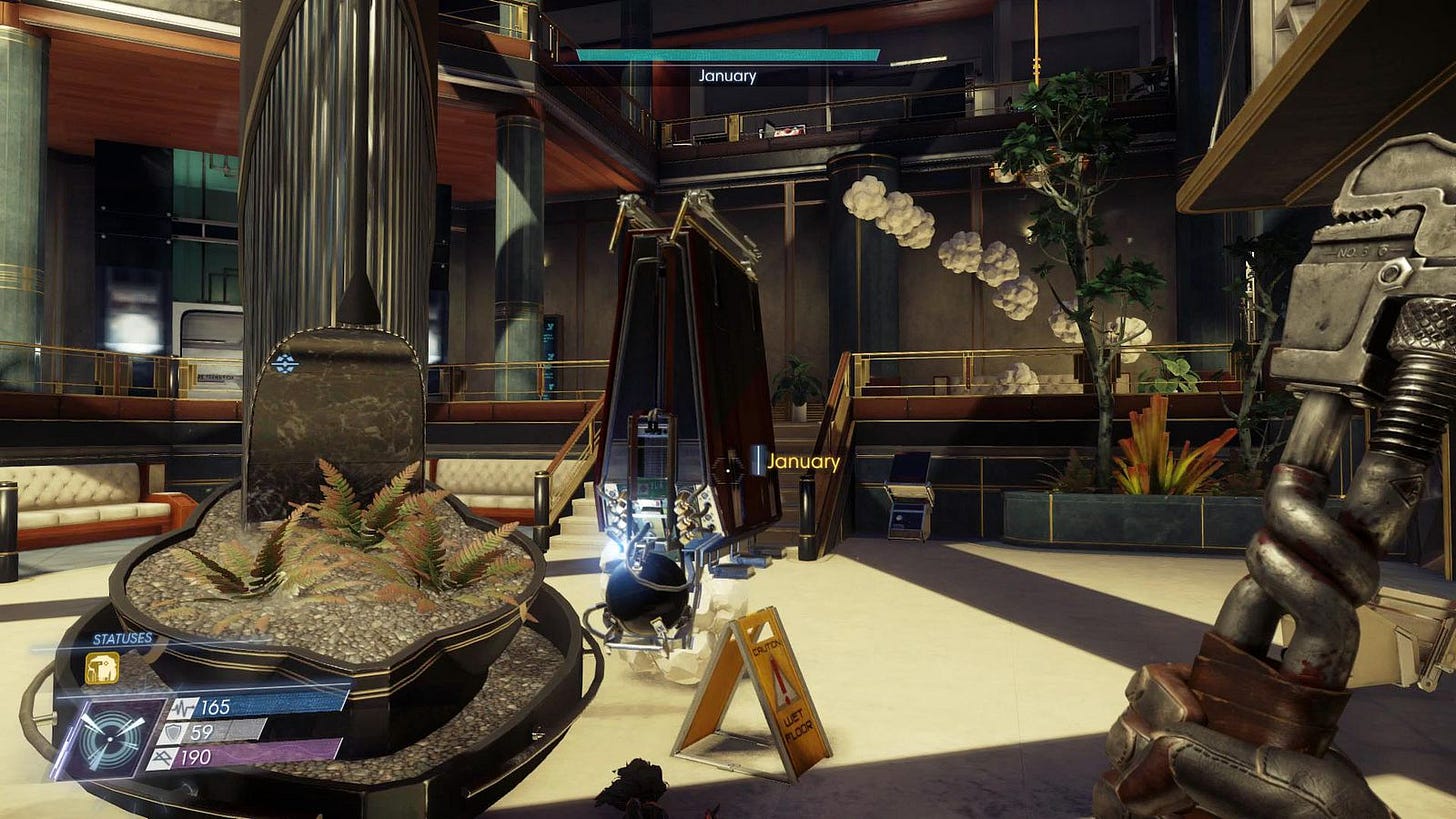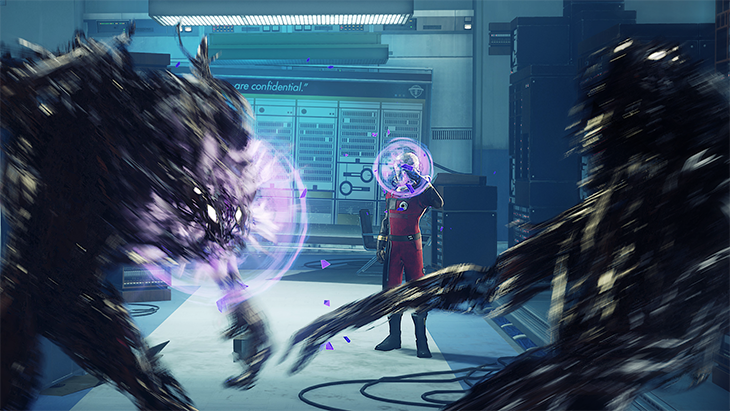Open Design and the Thrill of the Hunt in Prey

//This article contains spoilers to Prey (2017)
So, my academic career is, for the foreseeable future, over, and while I wait for my start date at my new job, I have all summer to relax, collect myself, and play some video games. What this meant for me was that I had a chance to catch up on those games I missed while I was in the trenches of my senior year, and I started with Arkane Studios's Prey.
The fact that I adore this game isn't particularly news. Arkane's cornerstone series up to this point, Dishonored, is a series I adore so much I had the Mark of the Outsider tattooed on my arm. The game's inspirations are not only Dishonored but other games I adore: Bioshock, Dead Space, and System Shock being some of the strongest influences. Also, it's a semi-open world game with great art direction, a unique premise, and strong mechanical focus, which, lemme check, yep, that is in fact a Bingo.
I wanna talk about Prey's mechanics, mostly because that's my forte, and I don't really have the qualifications to discuss the philosophy or literary pedigree of its premise or ending. What I like so much about Prey is that, tip to tail, it's a game about finding your own way. Every aspect of the game, from the mechanics to the story, funnels directly towards the central theme of solving a mystery.
For instance, take the quest design. I know I said I wouldn't talk about the story, but I need to a little bit in order to describe why I love the way that the quest system works in the game. You see, to say that Prey has an unreliable narrator isn't totally correct: the protagonist, the impeccably named Morgan Yu, is very reliable, in that he reliably has no idea what the hell is happening. Rather, what the game has is, to steal a term from systems design, multiple sources of truth.

You as the player receive quests from January, a robotic operator that Morgan himself programmed (to the point of giving it his own voice) to aid the now-amnesiac Morgan of the present in resolving the Talos I problem in a very specific way. In fact, you watch a video that past Morgan recorded in which he basically says "Yeah, believe January, he's the legit one". However, another operator, December, who also speaks with your voice, ends up coming along and proposing literally the exact opposite solution. As if this wasn't bad enough, your brother, Alex Yu, proposes a third solution unrelated to the first two, one which is also accompanied by a video of past-Morgan signing off on it.
So, while plenty of games give you the option of pursuing one of multiple endings to the main story, but separate them morally, Prey gives you similar option, but literally doesn't tell you which one is right. While this could be seen as frustrating, like the game is tricking you, the game doesn't then turn around and go "Hah, you picked the fake one, dumbass", but instead feels like it judges your choice appropriately given the amount of information you're given. The inclusion of multiple paths to the ending feel less like arbitrarily deciding "this will be my asshole playthrough", and more like you're actually taking a crack at solving the mystery. The branching quest design actually ties into the core themes.
Furthermore, Prey encourages you to try and solve mysteries in the game world, even if they aren't pertinent to the main quest, especially in regards to the people on board Talos I. Since Talos I was a sci-fi corporate entity, they had tracking bracelets for every employee on board to enable them to be tracked. This location data can be accessed via a security-enabled terminal by the player, meaning that the player has the means to track down the locations of every single crew member on board the ship (or, at least, their tracking bracelet).
This is amazing. For starters, it's such a good way to create a sense of realism on board this station, since instead of having nameless, faceless corpses littering the hallways like some sort of macabre decorations, every corpse has a name, and vice versa, every name haphazardly mentioned in an email or emblazoned outside an office door can be tied to a body. Furthermore, it means that Prey feels free to give the player tons of miniature objectives (such as hearing that someone took more than their requisitioned amount of ammo when they went out), and letting the player hunt them down and claim the rewards naturally, instead of engorging their quest log with tiny little meaningless quests. Again, it's all about solving mysteries, but the fluidity of this system, combined with the fact that you as the player have to opt-in to them, mean that you actually feel like you're discovering, hunting down, and solving these tiny stories instead of having them spoon-fed to you.

That's enough about the quest system. Prey also excels in that feeling of trying to find things out extends out even towards the combat and traversal mechanics. The fact that the first real gun the game gives you, the GLOO Gun, is arguably infinitely more useful as a traversal tool than as a weapon speaks to how much Prey wants you to explore with its systems and the physical world.
When you first start Prey, you feel like a completely powerless weakling as the base enemies are more than capable of completely ruining your day. Your weapons aren't terribly effective, and the ones that are run out of bullets almost immediately. Enemies seem to appear out of nowhere, and running from them seems to have an equal chance of you running into more danger as you going home free.
As the game progresses, you end up feeling more powerful in normal video game ways: your guns get better, you get more ammo, you get better guns, etc. But despite that, the game also uses that sense of exploration and mechanical focus to provide the same feeling.
There was a point, about halfway through the game, where I found myself facing down a new area to explore with extremely few resources. So, since the game heavily encourages backtracking, thanks to some puzzles that can only be solved with late-game skills in a manner vaguely reminiscent of a Metroidvania, I decided to go back to older areas and try to scrounge up what I needed to move forward.
When I was going through those old areas, I found something interesting. Since I was fairly familiar with the areas and their layout, instead of feeling like I was getting jumped by enemies, I was instead jumping them, knowing how to sneak around enemies and surprise them from obscure corners or leading them into turret traps I had left before.
Furthermore, I was much more resourceful in these fights, using knowledge I'd gained in experimenting with the combat to beat enemies using only the environment. My inquisitiveness was being rewarded by the game.
When I first walked through these zones, I felt like a horror movie protagonist, slow and careful. Now that I had taken the time to explore the area, to play around with the mechanics, and to gain a better understanding of the resources in the area, my second time through I felt like Batman, or perhaps more fittingly, like a Xenomorph sneaking through the ventilation ducts.
I think that's where Prey shines. Prey has a central idea: the player should explore this world in the way they so choose, and we should reward them for doing so. By facilitating this in every way the game can, it leads to this feeling where the player really feels like they are figuring the game out their own way, and not just ticking checkboxes off of a "mysterious" quest.